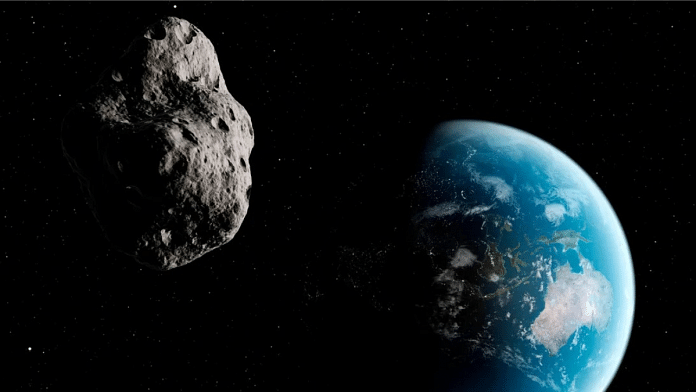New Delhi: A large “planet-killer” asteroid is soon expected to swing by Earth’s orbit, but does not pose a threat. Yet.
This potentially hazardous asteroid (PHA) has a diameter of about 1.1 km to 2.3 km and is allegedly in the top 5 percent of the largest space rocks ever found. While the asteroid has no chance of actually coming close to Earth, it could pose a threat to our planet centuries in the future, according to astronomers, as it swings back in its orbit.
The asteroid has been reported in the Astronomical Journal by the Carnegie Institution for Science in Washington. The lead author of the study Scott Sheppard and his associates found three significantly large asteroids, one of which is 2022 AP7. “Any asteroid over 1 km in size is considered a planet killer,” said Sheppard.
Sheppard’s team used a special telescope called the Cerro Tololo Inter-American Observatory in Chile. They could only scan the sky during a 10-minute window at twilight, since the sun’s brightness makes it difficult to notice these behemoths when they come from the direction of the sun.
While the other two asteroids discovered by the team do not pose any risk at all, 2022 AP7 also does not pose any threat to Earth in the near future. “It has no chance to hit the Earth, currently,” said Sheppard, since Earth will be on a completely different side of the sun, when the asteroid crosses its orbit. When it crosses, it will be as close as nearly 70 lakh kilometres to Earth.
This is not the first time that this planet killer is crossing our path. 2022 AP7 orbits the Sun once every five years. This year, even though it will enter Earth’s orbit when the Earth is on the opposite side, it may eventually catch up and sync its movement with that of our planet. But this is expected to happen centuries into the future.
“If this one hits the Earth, it would cause planet-wide destruction. It would be very bad for life as we know it,” Dr Sheppard said.
The asteroid hitting Earth would significantly reduce the planet’s temperature as light would not be able to reach the planet. That could also trigger mass extinction, way into our future generations, Dr Sheppard further said.
In order to offset impact from potential threats from celestial bodies, NASA’s Dart (Double Asteroid Redirection Test) mission was recently launched in September. The mission involved deliberately shoving a spacecraft into a harmless asteroid, to test if it could knock it off its course and alter its orbit. This experiment proved successful, and thus the method could be applied to protect earth against big space rocks.
Jay Tate, the director of the National Near Earth Objects Information Centre in mid Wales, however, said DART may not be the answer in 2022 AP7’s case, owing to how massive the asteroid is, but there could be other methods.
There are still roughly 50 undiscovered potentially dangerous asteroids out there, which get veiled by the sun’s strong glare – and this is a cause for concern. As per estimate, we have already discovered 95% of PHAs so far, out of the roughly 1,000 that exist.
However, another NASA project is in the works. The American space agency is working on a telescope under a project called Near-Earth Object (NEO) Surveyor to track down more of these planet-killers. It is expected to launch by 2028.
Also read: Why NASA is spending millions to crash a spacecraft into an asteroid



